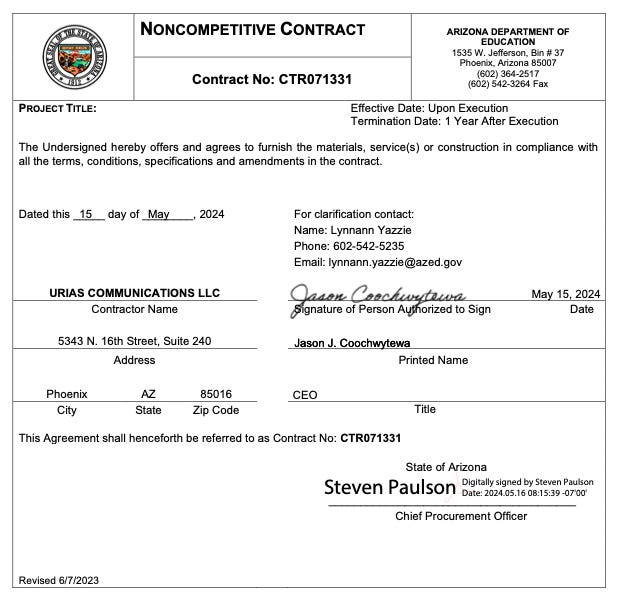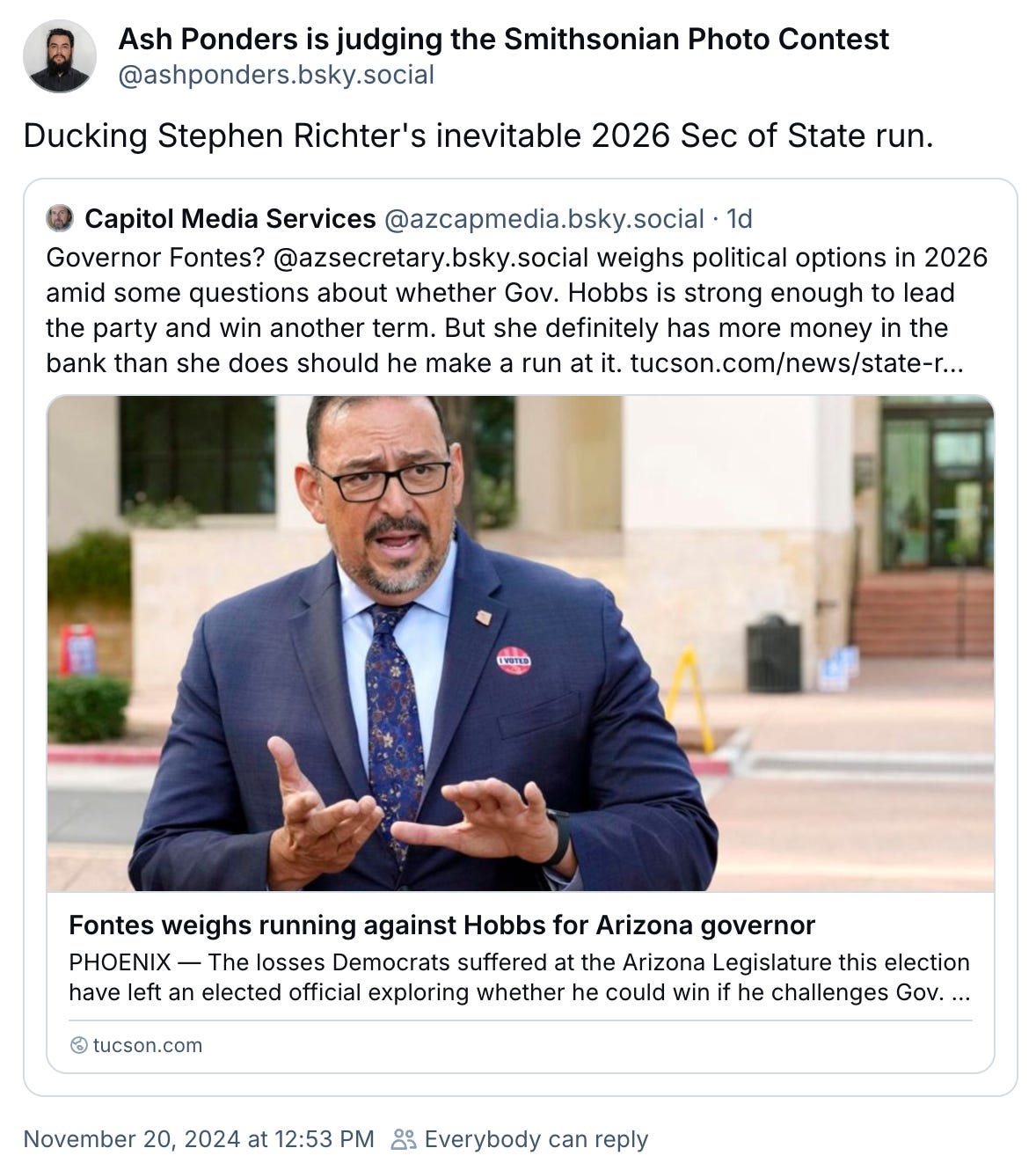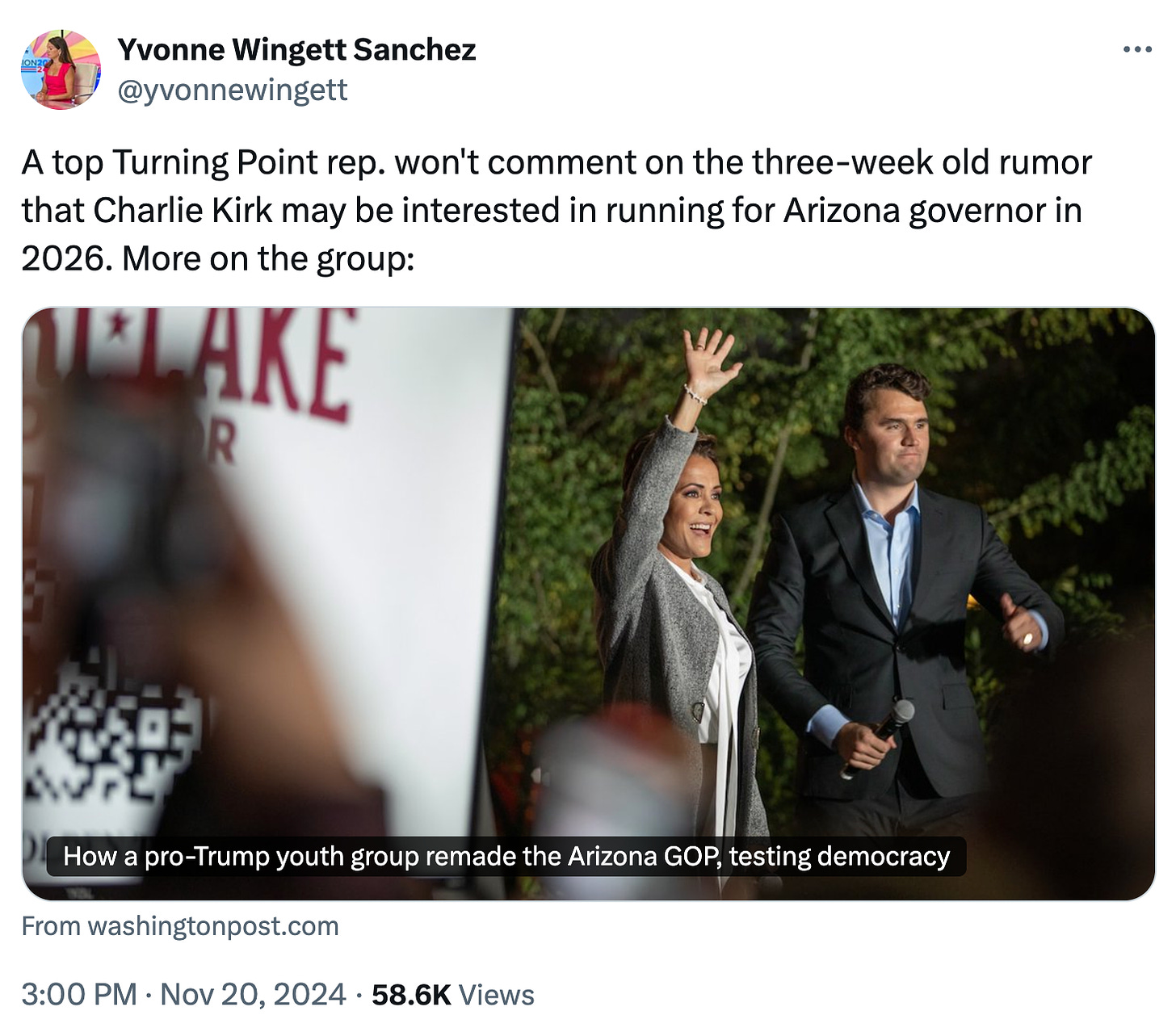
The bill for branding Arizona
Nepotism is our state brand … 2024 is also 2004 … And don’t dodge old rumors.
The Arizona Office of Tourism shelled out $700,000 to create a new state logo this year.
And of all the artists in the state who could have drafted that logo, the contract just happened to go to one who has close ties to the Office of Tourism Director Lisa Urias.
Part of the office’s mandate when coming up with the new logo was to include elements of Arizona’s Native American cultures in the design, and Urias’ business specializes in “diverse multicultural markets.”
The rebrand wasn’t cheap.
The Office of Tourism spent the $700,000, which came from federal pandemic relief funds, on 57 in-person and digital listening sessions across the state, not to mention the $27,500 that went to the brother of the CEO of Urias’ marketing agency. He helped work on the logo with a separate graphic design company.
And Urias Communications has another state contract.
“It's clearly an ethical violation. Whether or not it's a legal violation is another issue,” Sen. John Kavanagh said after we briefed him on the situation.
Jason Coochwytewa became the CEO of Urias Communications in 2021, per the company’s website. He’s the brother of Kevin Coochwytewa, a Hopi professional designer who’s worked with companies like the Heard Museum, Google, and recently, Heart & Soul Marketing — the graphic design firm that won the contract to craft the new state logo and marketing materials.
And the client section of Kevin’s portfolio also lists Urias Communications as a past customer.
Urias still owns the company with her namesake, but she “doesn't have any role in its day-to-day operations,” per Josh Coddington, the tourism department’s communications director.
Coddington said it was ultimately up to the contractor, Heart & Soul Marketing, whether to hire Kevin. But he acknowledged that Urias suggested they should hire him for the gig.
About a month after taking over as governor, Katie Hobbs tapped Urias to lead the state’s tourism department. One of her first acts upon taking the job was to launch the state’s image reboot.
And Urias had an edge as the long-time head of a well-known marketing agency.
She founded Urias Communications in 2006 as a firm “particularly focused on the Latino and Native American markets,” per a news release. Before that, she led international marketing for SRP.
Now, the state tourism department is working with an $8 million budget to persuade people to come here, and tourism spending is a huge driver for Arizona’s economy.
The appointment seems to have been an economic driver for Urias Communications as well.
More than a year after Urias became the tourism director, the Arizona Department of Education approved a $250,000, five-year contract with Urias Communications.
The contract is to manage events for the Office of Indian Education site, an arm of the state education department that administers state programs for Native American students.
The purpose of the agreement, according to the contract, is “to contract an event planning agency familiar with American Indian/Native American/Indigenous customs, traditions, values, beliefs and culture.”
It’s a non-competitive contract signed by Jason Coochwytewa, the CEO of Urias’ agency. Those types of contracts circumvent the state’s typical, extensive bidding-out process when “only one supplier possesses the unique ability or capability to meet the particular requirements.”
Again, Coddington from the tourism office said Urias has no part in the contracts.
But even if she isn’t involved with the day-to-day operations of the company that she founded, Urias seems to be financially benefiting from the state’s contract with her company at the same time she is pulling a salary from the state.
Time is a flat circle: Not only is Prop 314, the Secure the Border Act, a lot like Arizona’s anti-immigrant SB1070 from nearly 15 years ago, but the vibe of the state feels remarkably similar to back then. Just like SB1070, Prop 314 was broadly popular with voters, and just like in 2010, the rhetoric is heating up against immigrants, the Guardian writes after speaking with longtime Latino activists in Arizona. And on KJZZ’s “The Show” longtime Latino organizer Luis Ávila likens the vibe to 2004, when voters approved the anti-immigrant Prop 200.
“Proposition 200 prohibited undocumented families to access public services, state services, and if we remember that, you know it passed almost with 60% of the vote, (and) almost 40% of the Latino vote. Very similar to this, right?,” he told KJZZ’s Lauren Gilger.
Job qualifications matter: If Trump really wants to knock some sense into the woke U.S. Department of Education, he could appoint Doug Ducey to lead it, Wall Street Journal columnist Jason L. Riley writes. Riley floated a few names, but said as a former GOP governor with a strong record on school choice, Ducey would be a good pick — except he didn’t lie about the 2020 election for Trump so he’s probably a longshot.1 Meanwhile, Tom Horne, who leads the Arizona Department of Education, thinks Trump should just scrap its federal counterpart altogether, calling the department “useless,” per 12News’ Kevin Reagan.
Machismo is the new woke: Latino men voted for Trump because they feel responsible for the economic and physical security of their families, and the Biden administration didn’t help provide that security, U.S. Sen.-elect Ruben Gallego tells the New York Times in a profile of how he won Arizona. In a separate Q&A in the Times’ On Politics newsletter, he elaborated, saying Democrats ran on Joe Biden’s infrastructure achievements, but “Nobody gives a shit about infrastructure. Sorry.”
“Mr. Gallego had a built-in advantage as he bro’d out with Latino men in an effort to win their votes: He actually had the beer-drinking, backslapping macho background to make his actions feel real,” the Times wrote in its analysis of his appeal.
Leaving it blank: When filling out their ballots, voters were most likely to skip the Corporation Commission race, the confusing Prop 315, which dealt with executive actions, and the judges, Arizona Public Media’s Zachary Ziegler writes after studying the “undervotes” in the November election. About 1.2% of voters didn’t cast a vote for president, and twice as many skipped the U.S. Senate decision.
It’s not a mandate: Legislative Republicans shouldn’t let their newly increased numbers go to their heads, Substacker Robert Robb writes, saying their big wins were mostly on the coattails of Donald Trump.
“(Thinking of the election as a mandate for MAGA populism) is likely to lead to the sort of miscalculation that has swing voters constantly toggling between the two dominant parties, expressing sequential dissatisfactions,” Robb writes.
The arc of justice: The feds finally slapped former County Treasurer Elizabeth Gutfahr with criminal charges, the Nogales International reports. Months after an audit revealed her alleged decades-long embezzlement scheme, federal prosecutors charged her with felony embezzlement by a public official, money laundering and tax evasion.
Please don’t make us turn to embezzlement to fund this local independent news operation.
If at first you don’t succeed: Residents of San Tan Valley are attempting to incorporate as a real city for at least the fifth time in the last two decades, Axios Phoenix’s Jeremy Duda reports.
Turning Point USA founder Charlie Kirk may be running for governor, which is pretty funny.
But we’re also laughing at the slight outrage we sense in this tweet from the Washington Post’s Arizona reporter, Yvonne Wingett Sanchez, about the age of the rumor that Turning Point refuses to comment on.
Because as every good reporter knows — if the rumor is more than a week old, you must comment!
After that column was published, Trump nominated someone else to lead the U.S. Department of Education.















Tom Horne knows something about being useless.